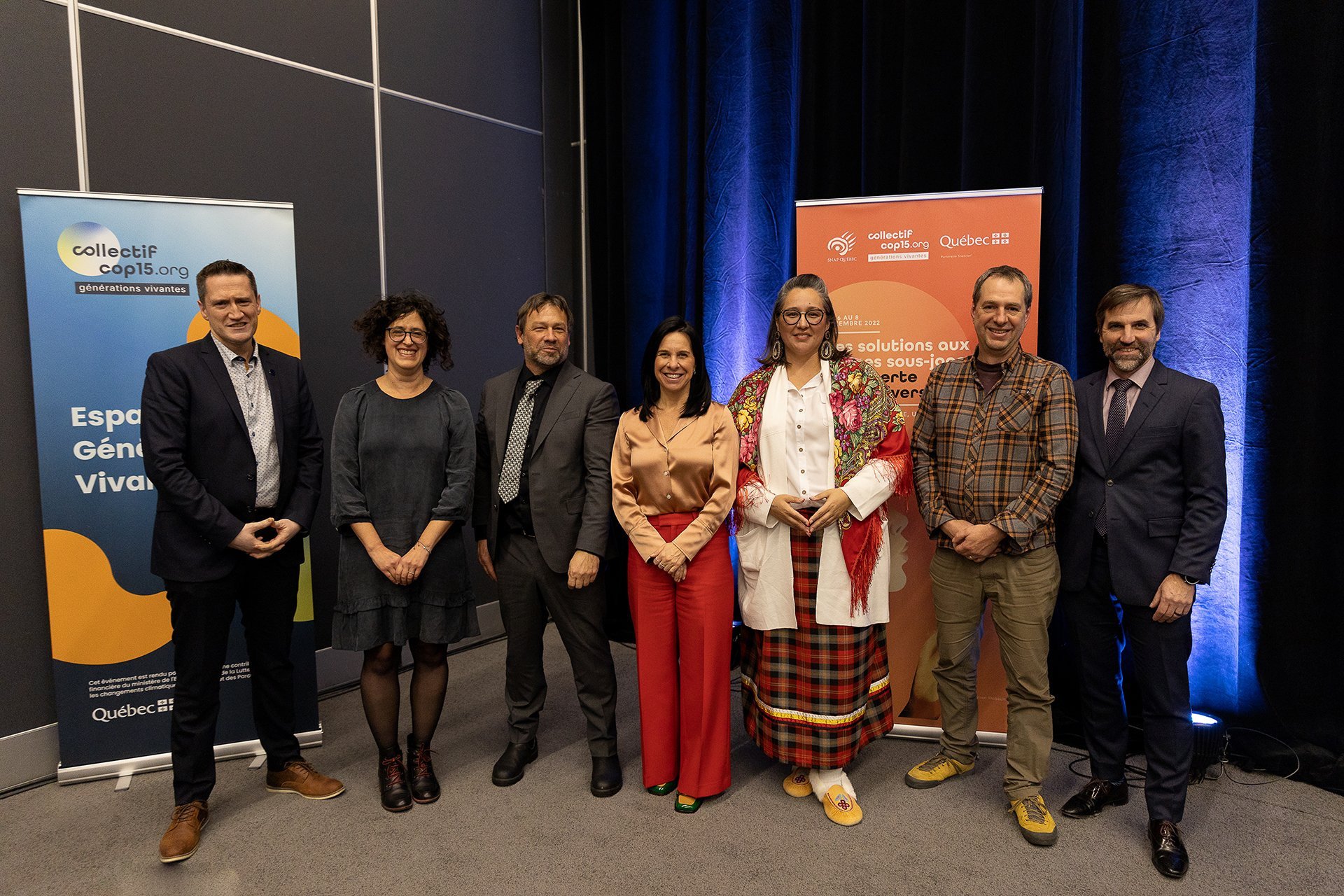
Join and share the Montreal Call
#AppelMTL
#MTLCall
The Montreal Call: An invitation to dialogue on systemic changes
During COP15 held in Montreal from December 7 to 19, 2022, the Collectif COP15 of Quebec civil society, under the leadership of SNAP Quebec, organized an international conference on the solutions to the underlying causes of biodiversity loss.
The Montreal Call was launched following this event, as an invitation to parties around the world to continue and accelerate this reflection on solutions enabling the implementation of changes to a damaging economic model and value system for nature at future COPs, biodiversity and climate combined.
Governments, ministers, delegates, indigenous representatives, leaders of multilateral organizations, civil society agencies, youth groups, academic organizations, foundations and the private sector, as well as citizens, are invited to publicly express their support for the Montreal Call.
The unveiling of the Montreal Call, on December 8, 2022, took place in the presence of Montreal Mayor Valérie Plante, the Grand Chief of the Cree Nation Government Mandy Gull-Masty, the Minister of the Environment, the Fight against Climate Change, Wildlife and Parks Benoit Charette, as well as the Minister of Environment and Climate Change Steven Guilbeault.
The Montreal Call was endorsed by
The City of Montreal
The Government of Quebec
The Government of Canada
The Cree Nation Government
And other organizations

Support the Montreal Call
I support the Montreal Call
The Montreal Call
We, heads of government, ministers and delegates, Indigenous representatives, heads of multilateral organizations, leaders of civil society and representatives for youth, academia, foundations, and the private sector, welcome the commitments made by a multitude of actors gathered for COP15 in Montreal, Quebec, which is hosting the Secretariat of the Convention on Biodiversity.
We reiterate that the pace of nature’s decline over the past decades is unprecedented in human history. According to IPBES, the direct drivers of these changes – those with the greatest global impact – are: alterations in land and sea use, direct exploitation of living organisms, climate change, pollution, and invasive alien species. These five key drivers stem from a group of underlying causes that are in turn rooted in an economic system and a system of values that are harmful to nature.
We understand that nature makes vital contributions to humanity and that its decline threatens human well-being, including food security, human health, and intangible aspects of quality of life such as cultural integrity. In the face of nature’s decline, technological alternatives have limits, and some of nature’s vital contributions remain irreplaceable. In addition, Indigenous peoples and the most impoverished local communities are experiencing the negative effects of nature’s decline to a greater extent, even though the lands they manage, use, and occupy are deteriorating at a slower rate than elsewhere.
We hear the repeated calls from the IPBES and the IPCC to urgently address the underlying causes that the two major interrelated environmental crises of biodiversity loss and climate change have in common and to make systemic changes. We recognize that changes targeting only the direct drivers of nature’s degradation will not be sufficient to reverse nature’s decline. The Post-2020 Global Biodiversity Framework calls on businesses to reduce risks to biodiversity by moving towards methods of extraction and production, supply and delivery, and use and disposal that are fully sustainable. The global framework calls on governments to redirect, reallocate, reform or eliminate economic incentives that harm biodiversity. The framework also calls on all of us to at least halve the waste we produce and, where appropriate, to reduce our overconsumption of food and other materials.
We take note that at COP15 in Montreal in December 2022, civil society stakeholders came together to initiate a discussion on the underlying causes of nature’s decline, to consider the issues involved in implementing systemic change, and to outline possible solutions.
We wish, in addition, to facilitate visions of the good life that are not based on an unsustainable increase in material extraction and consumption, as well as on the externalization of their negative consequences onto others and nature; to develop economic institutions and values that are compatible with respecting planetary limits; to address inequalities that undermine the capacity for sustainability; to ensure inclusive decision making that incorporates the various ways that nature is valuable; to ensure fair and equitable sharing of the benefits arising from the utilization of genetic resources; and to respect human rights in conservation decisions — all of these concepts form the backdrop to the discussion.
We welcome the start of a dialogue on solutions to the underlying causes and call for accelerated follow-up to this reflection at the next Climate and Biodiversity COPs, in order to implement the necessary systemic changes.
We call on the leaders of all governments and partners to express their support for The Montreal Call, in order to safeguard the world’s future.

“Civil society’s leadership during COP15 in opening dialogue on the underlying causes of biodiversity loss demonstrates that the solutions are also within human nature. We must take back control of our future and our economy and elevate the defense of nature to a core value.”
Alain Branchaud
Executive director of SNAP Quebec and spokesperson for the Collectif COP15
Join the Montreal Call
You can download the Montreal Call in the language of your choice below.
Warning: the official versions of the Montreal Call are the documents in French and English. The other languages can be subject to changes.